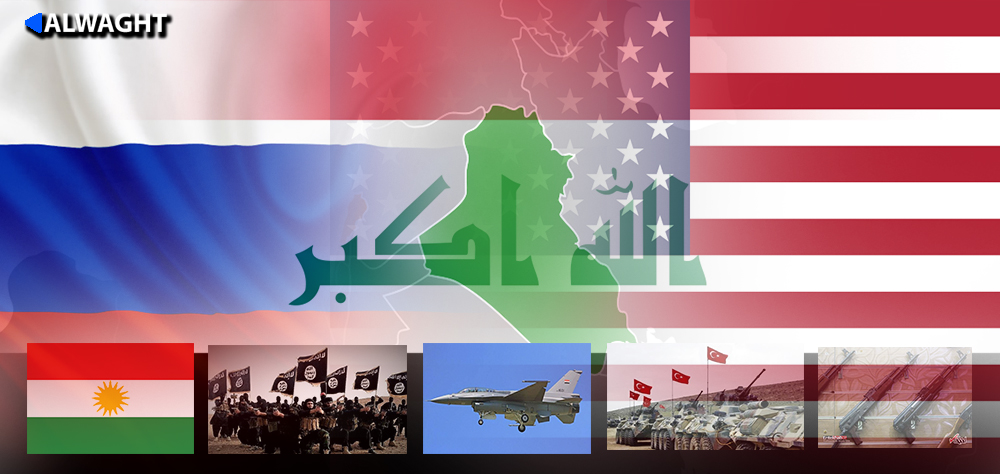Alwaght- After 2003, Iraq has been facing two levels of security threats. In addition to instability caused by the American occupation, the Turkish attacks on the north, the ISIS terrorist group emergence in 2014, and also the referendum held by Erbil for independence from Iraq in 2017 immersed Iraq in an atmosphere of insecurity. All these challenges motivated the Iraqi leaders in recent years to start a considerable effort to procure, develop, and strengthen needed arms.
In the meantime, it is noteworthy that on the one hand, the Americans claim to be supplying Iraq's military facilities and oppose Baghdad purchase of weapons from other countries, and on the other hand, the Iraqi government considers the US services inadequate and wants to buy weapons and military supplies from other international sellers, against the American will.
This issue, hotly debated in recent months especially about the purchase of advanced missile defenses as well as advanced fighter jets by Iraqi political and military officials, has sparked Baghdad-Washington disputes. It has become one of the most important topics of strategic dialogue between the two sides. Here is a question: Why does the US want to expand its military relations with other countries, in addition to the US?
F-16 jets and Baghdad leaning to Russian arms
The first and perhaps most important motivation of the Iraqi government to turn away from American weapons and the tendency to buy Russian weapons is related to the purchase and support of F-16 fighters. The Iraqi air force purchased 36 Lockheed Martin F-16 Viper fighter jets from the US under a military contract in 2011, but two of the fighters were lost in the first round of training. The remaining 34 were assigned to the 9th Squadron at Balad Air Base, 64 kilometers north of the capital Baghdad. From the very beginning, Washington refused to deliver the fighters on time, and it was from 2014 to 2017 that 34 aircraft were delivered to Iraq.
After the delivery of warplanes, which sparked a wave of discontent in Iraqi political society, their maintenance was a new headache for Baghdad. Evidence suggests that out of 34 fighter jets based at Balad base, at least 10 are not able to fly at all. Moreover, almost more than half of the fighters that are able to fly, lack proper radar and avionics. Lockheed Martin as the manufacturer of these aircraft, actually, did not provide technical and maintenance services to the Iraqi purchaser. Sallyport, an American military contractor that in 2018 won a contract to support Iraq's F-16 program, recently evacuated Balad Air Base.
Iraqi officials have announced their intention to buy Russian fighter jets since August 2020. Baghdad has put high on its military renewal program the purchase of Russia's Su-57, the most powerful Russian fighter, and the MiG-29, equipped with air-to-air missiles and active self-guiding radar. This indicates that the Iraqi politicians, following US failure to meet its service provision promises, are deeply frustrated and are seeking to work with Russia to boost their air force.
Delay, ignorance of meeting Iraqi military needs
In addition to the F-16 fighter jets case, Iraq is facing many shortages and problems in meeting its needs in missile defenses, strategic offensive systems, and military radars. Over the past two decades, Baghdad has repeatedly sought to purchase advanced military weapons and missile defense systems, but each time Washington turned a deaf ear. This is at a time when the Americans have been selling weapons extensively to the Israeli regime and the Persian Gulf Arab states, urging Iraqi government to seek to strengthen its air defenses through cooperation with Russia and the purchase of the S400 missile defense system from Moscow. While fed up with the US failure to meet their military needs, the Iraqis are aware of the high capabilities of the Russians when it comes to manufacturing air defenses. The Russian air defenses, apparently, beat the rival American Patriot systems, in terms of cost and efficiency.
American challenges for Iraq's internal policy and foreign relations
The US actions in recent years have themselves become a motivation for Iraq to diversify its military purchase origins. After 2009, the year the US signed security pact with Iraq, Washington established its military and security cooperation with Baghdad. However, it has never been honest in this partnership. This showed itself obviously to the Iraqi leadership and public when ISIS emerged in Iraq and captured large tracts of land and the Americans refused to help Baghdad to deter the terrorists.
Washington's role in the emergence, strengthening, and perpetuation of ISIS has become a tangible and undeniable fact in recent years. In addition to this, the US opposition to the Iraqi parliament's decision to expel foreign troops, which was approved on January 5, 2020, is another important issue that has heightened dissatisfaction with the US actions. Also, the attacks on the Iraqi Popular Mobilization Forces (PMF), as the key force in opposition to the terrorist organization, of the so-called US-led anti-ISIS military coalition destroyed the trust in Washington and its policy as a security partner. This gives the Iraqis every reason to seek new partners and break with total reliance on the Americans who showed not only they are untrustworthy but also seize any opportunity to undermine Iraq for the good of their military stay in the Arab country.
How anti-US groups in Iraqi government affect Washington-Baghdad military partnership
Another reason Baghdad shows interest in reviewing the military relations with Washington is the power and legitimacy gain of anti-American groups in the Iraqi government structure. In other words, the anti-American discourse in recent years grew popular and most supported in the Iraqi politics, with a majority of the Iraqi parliamentary factions pushing for foreign withdrawal from the country.
With these groups and the pro-expulsion agenda finding a popular base in the Iraqi society, the Iraqi government approach receives indirect influence making it scale down military cooperation with the US and seek new military partners.



























